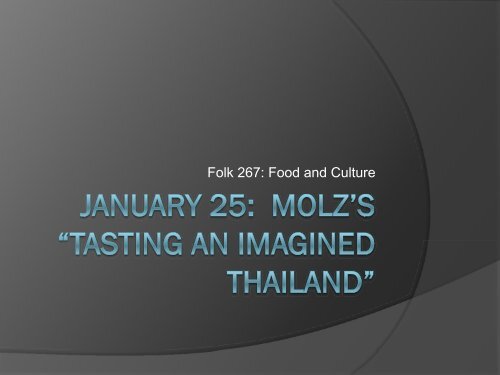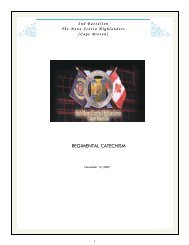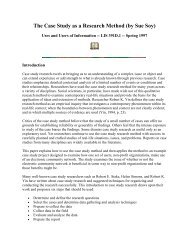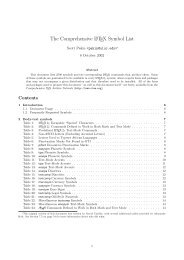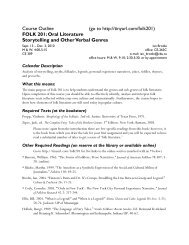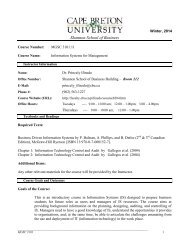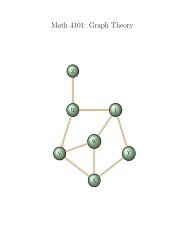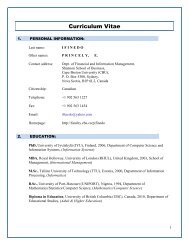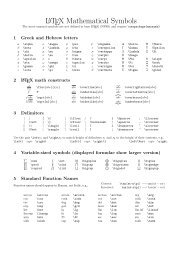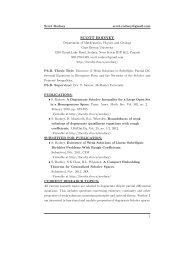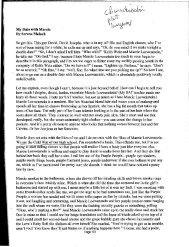Tasting an Imagined Thailand
Tasting an Imagined Thailand
Tasting an Imagined Thailand
Create successful ePaper yourself
Turn your PDF publications into a flip-book with our unique Google optimized e-Paper software.
Folk 267: Food <strong>an</strong>d Culture
Once again…Tourism is a quality of experiencing, not a particularbehaviourThe focus is on othernessThe intensity of that experience is correlated to itsauthenticity“Authenticity,” the idea of what is “genuine,” is itself aconstruct, a judgment by the experi<strong>an</strong>dSimult<strong>an</strong>eously, as <strong>an</strong> industry, tourismcultivates/constructs/<strong>an</strong>ticipates the tourist’sexpectations of “authenticity”There is a process of negotiation by the experi<strong>an</strong>d(the tourist, the audience, etc.) on the authenticity ofthe experienceWhat is authentic, <strong>an</strong>d why do we / should we care?
Molz <strong>an</strong>d “<strong>Tasting</strong> <strong>an</strong> <strong>Imagined</strong> Thail<strong>an</strong>d”
Ethnic Restaur<strong>an</strong>ts Urry: “People are much of the timetourists”• Often employing the tourist gaze:deliberately seeking/seeing otherness asleisure activity Eating out as a form of “identity work”• The restaur<strong>an</strong>t becomes “a theater forthinking <strong>an</strong>d fashioning a self” Restaur<strong>an</strong>t as “symbolic stage”
Front- <strong>an</strong>d backstage Front: where one perform<strong>an</strong>ce team(staff) adopts a ‘script’ for encounter with<strong>an</strong>other perform<strong>an</strong>ce team (clientele) Back: where the script c<strong>an</strong> be dropped<strong>an</strong>d the perform<strong>an</strong>ce of the staff c<strong>an</strong> besuspended, outside of the view of theother perform<strong>an</strong>ce team• (My Louisbourg example is <strong>an</strong> extremeversion of this)
“Perform<strong>an</strong>ce of authenticity” “Restaur<strong>an</strong>t owners <strong>an</strong>d designersobviously realize <strong>an</strong>d attempt to cater totheir customers’ desire for <strong>an</strong> authenticexperience.” (cf. Long’s strategies of negotiation)
The Menu Explicit statement that food is authenticor original, or ingredients <strong>an</strong>d cookingtechniques adhere to traditional recipes,as do styles of serving <strong>an</strong>d eating Inclusion of famous ethnic dishes, orinclusion of slightly obscure with framingdevice of authenticity Silent omission of other dishes(sometimes available by request)
The Ingredients Claims to inclusion of authenticingredients Silent substitution with local ingredientswhen (a) original not locally available<strong>an</strong>d/or (b) when original consideredunpalatable Again, silent omission of certainingredients altogether
The Décor “Use native artwork, decorations, <strong>an</strong>dmusic to suggest that the restaur<strong>an</strong>treally is <strong>an</strong> enclave of […] culture.” Also, costume (of staff), table settings,color palette, etc.
“Negotiating Authenticity” CLAIM: the restaur<strong>an</strong>t is a prepared “text”<strong>an</strong>d a perform<strong>an</strong>ce of authenticity by theperform<strong>an</strong>ce team of the staff/owners• By virtue of it being a perform<strong>an</strong>ce, it is not“authentic” BUT: this “text” is not passively receivedbut actively interpreted by the perform<strong>an</strong>ceteam of the clientele• SO: the “authenticity” of the text is negotiated
The dilemma What is import<strong>an</strong>t? The tourist having <strong>an</strong>authentic experience, or the touristinterpreting their experience asauthentic? Is “authenticity” a fixed, qu<strong>an</strong>tifiable,ontological thing, or is it alwaysemergent, negotiated, <strong>an</strong>d constructed?
The restaur<strong>an</strong>t Owners stage authenticity based ontheir expectations, perceptions <strong>an</strong>d<strong>an</strong>ticipations of what their intendedaudience underst<strong>an</strong>ds as authentic Clientele measure <strong>an</strong>d negotiate theauthenticity of their experience based ontheir expectations, perceptions, <strong>an</strong>d<strong>an</strong>ticipations of authenticity• Clientele construct a set of criteria formaking that judgment
Esoteric <strong>an</strong>d Exoteric 1 st level (direct)• Esoteric: how we underst<strong>an</strong>d ourselves• Exoteric: how we underst<strong>an</strong>d others 2nd level (reflexive)• Esoteric: how we underst<strong>an</strong>d theirunderst<strong>an</strong>ding of us – what we think theythink about us• Exoteric: how we underst<strong>an</strong>d theirunderst<strong>an</strong>ding of our underst<strong>an</strong>ding ofthem – what we think they think we thinkabout them
Esoteric, exoteric, <strong>an</strong>d culinarytourism Restaur<strong>an</strong>t owners frame <strong>an</strong> experienceon their reflexive esoteric underst<strong>an</strong>ding• Thai owner: “What I think they think isauthentically [Thai].” Clientele judge that experience on direct<strong>an</strong>d reflexive esoteric underst<strong>an</strong>ding• North Americ<strong>an</strong> client: “What I think isauthentically Thai; what I think they think Ithink is authentically Thai.”
Criteria Clientele who have travelled to Thail<strong>an</strong>duse their travel experiences to setcriteria Those who haven’t base expectationson media images, etc. “Spiciness” as comparative measure(between two restaur<strong>an</strong>ts, e.g.) Perceived ethnicity of staff <strong>an</strong>d otherclientele
Criteria (cont.) Some reluct<strong>an</strong>t to judge authenticity atall Thus is created <strong>an</strong> implicit, sometimesexplicit, hierarchy of authenticity arbiters Whether judged “authentic” or not,personal criteria of (relative) palatabilitybecomes critical determining factor forreturn
Negotiated identity Voluntary participation in theexperiencing of Otherness through(culinary) tourism is as much about theOther as it is about reaffirming the Selfin relation to the larger, global culturalmatrix
“Levels” of tourist Existential – maintains a rigid set ofexpectations for judging authenticity (to getlost in the Other) Experimental – Looking for truly Other Experiential – Wishes for intensedistinction from everyday Recreational – More interested in pleasureth<strong>an</strong> “authentic experience” Diversionary – unconcerned withauthenticity of their experiences
Post-Tourist Delights in the inauthenticity of theexperience
Go away now. For next class: Pilcher’s “From‘Montezuma’s Revenge’ to ‘Mexic<strong>an</strong>Truffles’”


